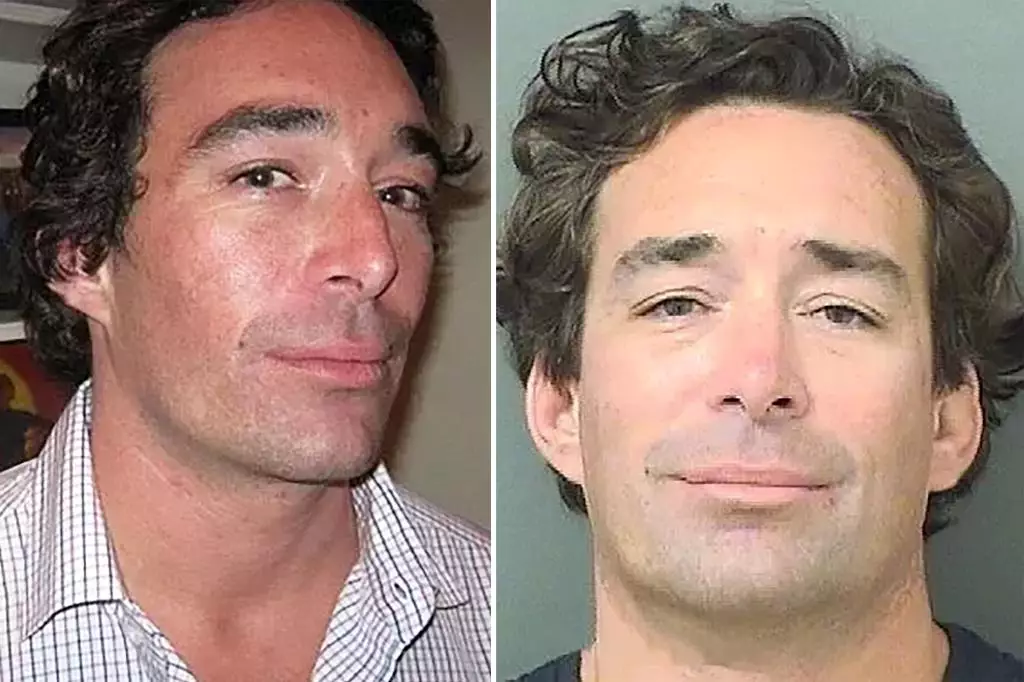The recent legal troubles surrounding Alexander “Nico” Fanjul highlight an unsettling dichotomy between wealth, privilege, and accountability. Known as a member of the affluent Fanjul family, owners of Florida Crystals and Fanjul Corp, Nico’s status fails to shield him from serious allegations of domestic violence. His recent guilty plea, which resulted in four years of probation and 200 hours of community service, underscores the gravity of his actions while simultaneously raising questions about the implications of wealth on behavior and justice.
The domestic violence incident occurred earlier this year in Palm Beach, Florida, revealing a disturbing pattern of behavior. According to police reports, emergency responders found Fanjul hovering over a woman in a vulnerable, fetal position, who reportedly sustained injuries and believed her life was in danger. Such graphic descriptions do not merely suggest a one-time lapse; they indicate a potential cycle of violence that has marred Fanjul’s relationships and tarnished his reputation.
The events that unfolded on that fateful night are both shocking and indicative of deeper societal issues. Following a seemingly innocuous evening at the upscale Flagler Steakhouse, tensions escalated when Fanjul objected to being seated next to a same-sex couple. The police report detailed how his outrage led to violent confrontations. Although representatives for Fanjul later refuted claims regarding his reaction to the seating arrangement, the fact that an argument erupted at such a public venue earns substantial scrutiny.
Moreover, his subsequent recourse to luxury rehabilitation programs raises eyebrows. In March, after his arrest, Fanjul reported to a trendy facility in Colorado, known for its previous celebrity clientele. While the importance of seeking help for substance abuse and behavioral issues cannot be underestimated, the nature of his treatment reflects a broader cultural conversation about whether affluent individuals receive preferential treatment during legal and personal crises.
This recent incident is not the first time Fanjul has faced allegations of abuse. In April of this year, separate charges emerged when another unnamed female associate accused him of tackling her violently during an altercation. This disturbing pattern of behavior raises deep concerns about his capability for change and highlights a predicament faced by many involved in domestic violence—often, prior incidents go unreported or, worse, are not acknowledged.
Fanjul’s connections to high-profile individuals compound the issue. Previous allegations made by Tinsley Mortimer—a well-known socialite and former “Real Housewives of New York” star—surfaced in the past, with claims of physical confrontations dating back nearly a decade. Reports of a hospitalization due to a head injury after a heated exchange with Fanjul indicate a troubling history of violence that transcends time, hinting at deep-rooted issues that perhaps no luxury treatment can genuinely address.
As part of the elite, Fanjul’s case illuminates chilling truths regarding how wealth can often insulate individuals from the full brunt of legal repercussions. Often, those who possess financial means find their way to treatment facilities rather than facing jail time. The sheer fact that Fanjul is able to undergo rehabilitation in plush surroundings while individuals from less privileged backgrounds may languish in prison for similar if not more serious offenses raises serious questions about equity in the justice system.
Furthermore, the public’s reaction to his situation underscores the broader societal expectations placed on prominent figures. Society praises those who seek redemption and personal growth, yet many are left to wonder if such redemption is feasible when it is afforded in a privileged atmosphere. The outpouring of support from his representatives indicates a desire to rehabilitate his public persona, yet real change must come from accountability for one’s actions—something that could be significantly overlooked with financial safeguards.
The Alexander Fanjul case serves as a stark reminder that money and influence are not antidotes for accountability. As he embarks on a path of rehabilitation, the hope remains that Fanjul recognizes the gravity of his actions and the broader implications they hold. Domestic violence is a societal issue that transcends status, and those involved must recognize their responsibilities—not only to their victims but also to themselves and their communities. With the right emphasis on reflection, genuine change could pave the way for restoring his fractured image and, more importantly, healing for those he has harmed. The real question, however, remains: will he truly learn from these experiences, or will this cycle continue unchecked?

